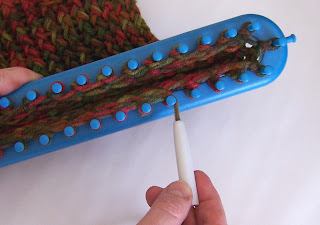Last Spring, I loom knit five youth and adult size sweaters in three months, all using two strands of Red Heart worsted weight yarn. I know many people rave about that yarn. It certainly is inexpensive for a large quantity of yarn, and comes in about any color you can imagine. However, I have a hard time working with that yarn for larger projects as it dries out my fingers terribly, to the point where my cuticles crack and bleed no matter how much lotion/lanolin/beeswax I use.
A while ago, in a moment of forgetfulness, I bought a large quantity of Red Heart variegated worsted with gorgeous jewel tone colors, perfect colors for me! It just jumped into my arms and whispered in my ear how it needed to be a sweater for me. It sat in a bag in a corner for a few months, patiently waiting. Now I think enough time has passed since I last knitted a sweater that I'm finally up to knitting another: no small project! I knit up my gauge swatch, sketched out the design and calculated rows, stitches, decreases, etc. I cast on a few days ago, but first, I threaded one of those yarn tools onto the yarn!
What I have discovered is that the yarn tool works really well for e-wrap stitches, because you wrap all the pegs in the row, then go back and knit off. For stockinette (flat) and purl stitches, it just gets in the way. I also discovered that I wrap the pegs much tighter with the tool than when I use my fingers! So I've come up with a way to wrap the pegs to still maintain an even and looser wrap. When I e-wrap the peg, I start from the inside of the loom, wrap around the peg, and end up back on the inside of the loom. Instead of just wrapping around the peg, I pull the yarn tool past the peg and away from the loom, then come back on the other side of the peg to the inside of the loom. This adds enough play to the yarn to keep the wraps from being too tight.

I also discovered a bonus: I can wrap the loom much faster using the tool than doing it by hand. And so far, the tool has been wonderful in protecting my fingers from the yarn.
something that I have found to be a big help with the weave it tool, use hook and loop dots, the loop side on the weave it,and the hook side on the underside of the loom. then when you are done wraping your pegs you can attach your weave it to the underside of the loom and you don't have to worry about "fishing" for it when you are ready to do your next set of wraps.
ReplyDeleteI haven't had a problem losing the yarn wrapping tool, but that may be because I'm using two strands of yarn as one, so the tool doesn't slide freely on the yarn. As the project gets longer, be careful that the knitting doesn't get caught on the velcro tabs. A small rubber band on the wrapping tool that can be stretched and hooked onto an end anchor peg or several unused pegs may work also. Thanks for the tip!
ReplyDelete